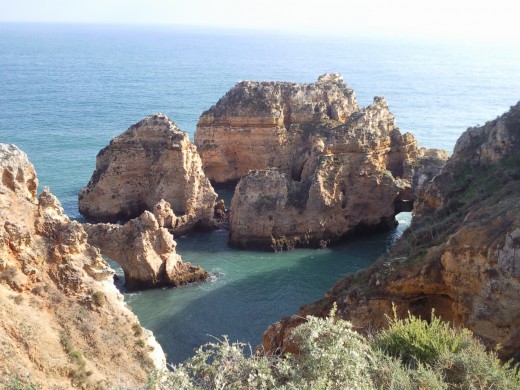
Lagos and near by:

History:
It is the only modern day city I know to have been founded and fortified by the original people of the Algarve; the Conii or Cynete. It was founded by the Conii in 1899BC. It has a fascinating early history too deep to recount fully in this summary.
Lagos was a town of significant importance early in it's history and quickly attracted the attentions of the Romans and Carthaginians. The Roman conquered the town by force in 76AD. They name it Lacóbriga, and from here comes it's modern name Lagos. Archeological remains of a “salting” facility have been found as well as a Roman pottery doting from this time.
Lagos has a very interesting and different history from the rest of the Algarve. Here we find a town that far from thriving under the Moors, it dwindled. The Moors took the city over in 716 AD and renamed it Al-Zawaia. It would not be until the Christian reconquest after 1249 AD that the city would rise in grandeur and prosperity once again.
Due to it's geography, the woods near by and it's fishing and slating industries, it was Lagos that was chosen as the place from which the discoveries would be launched. Right from the beginning of the discoveries the town played an important role. Hosting the the Portuguese Armada that was to invade north Africa in 1415. Henry the Navigator was to make this town his home and it was fromLagos that many expeditions down the African coast were launched. The town would eventually become a city in 1573 and be fully fortified against English pirates that would often raid it.
In similarity with the rest of the Algarve the town fell into decline in the 17th century due to the silting of the River Molião (which nowadays is nothing more than a stream) and culminating in the 1755 earthquake. The earthquake brought with it a huge tsunami and given Lagos' location the town was particularly vulnerable, the whole town being mostly destroyed.
The town would thrive once again in the 19th century due to it's industries and the building of the EN125 road and the railway line. It became one of the first places of touristic interest in the Algarve due to the construction of the infrastructures. As with the rest of the region, the town has blossomed through the tourism industry.
Sport:
Although lacking any large sporting clubs, Lagos is a hub for sport. It usually plays host to a stage of the Volta ao Algarve and has some big events in Athletics and road running. It is also famous for it's sail school.
Culture:
Culturally this town has a lot to offer between it's many museums, chapels and ruins. Added to this it also has a busy cultural agenda. The town has also got an eclectic mix of people inhabiting it which contrasts with the rest of the towns on our itineraries. I recommend a good read of the municipalities website as it is very well put together with regards culture:
https://www.cm-lagos.pt/portal_autarquico/lagos/v_pt-PT/menu_turista/concelho/cultura/
Nature:
Lagos possess some places of immense natural beauty. The first which comes to mind is the “Ponta da Piedade”. This a cape, an outcrop of limestone. It is very beautiful and has fantastic views across Praia Grande and to Portimão and the limestone cliffs of Lagoa. The view also takes in the prominent Monchique mountains. Which although not high, seem so imposing.

Beaches:
Lagos has a wide choice of beaches. From the long stretch of sand at praia Grande to the little beaches and cove among the cliffs like Praia da Dona Ana. It also has beaches of a distinctly different type at Praia da Luz and beyond where the geology of the landscape changes visibly.